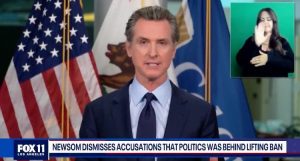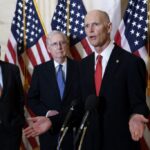The massive unemployment claims fraud case in California is growing even bigger as authorities are now estimating that the state has paid out at least $11 billion in false claims for benefits, with another $20 billion in claims appearing “suspicious.”
The state paid out a total of $114 billion, with about 10 percent being identified as fraudulent so far. That total could go up to 17 percent if most of the additional $20 billion in claims prove to be fraudulent, as expected.
Nearly all the money came from the Pandemic Unemployment Assistance program that formed part of the CARES Act.
Labor Secretary Julie Su said, “There is no sugarcoating the reality. California did not have sufficient security measures in place to prevent this level of fraud, and criminals took advantage of the situation.”
While conceding the state was unprepared, Su also faulted the Trump administration for failing to provide the state with the guidance and support needed to foil sophisticated fraud rings. She said an array of safeguards put in place last year had blocked billions of dollars in potential fraud schemes.
Su described an agency struggling to keep up with a flood of new jobless claims as the pandemic shuttered businesses and sent unemployment rates soaring. And that reservoir of new money was also a lure for criminal enterprises.
“It should be no surprise that EDD was overwhelmed, just like the rest of the nation’s unemployment agencies,” Su said. “As millions of Californians applied for help, international and national criminal rings were at work behind the scenes working relentlessly to steal unemployment benefits using sophisticated methods of identity theft.”
So now the fraud scheme is Washington’s fault because the federal government didn’t offer “guidance and support”? Perhaps as much as $30 billion has been given to criminal organizations and it’s because California didn’t get “guidance” from Washington? Guidance to do what? Maybe occasionally check to see if the person receiving the check was real or not?
There wasn’t anything sophisticated about California’s fraud prevention. It was non-existent.
Prosecutors around the state have been targeting unemployment benefits fraud in recent months. On Monday, Orange County District Attorney Todd Spitzer announced charges against two business owners who opened up a storefront in Garden Grove, California, for the sole purpose of filing false unemployment claims. He also announced the prosecution of eight people, including six state prisoners, involved in two other unemployment fraud schemes.
Also Monday, House Speaker Nancy Pelosi and California Sens. Dianne Feinstein and Alex Padilla, all Democrats, urged President Joe Biden to create a federal task force to help states deter organized criminal fraud in jobless claims.
When trying to hide government malfeasance, create a “task force” that will bury the issue.
If states can’t detect and deter organized criminal fraud, they have no business handling taxpayer money. While other states also suffered losses due to fraud, why didn’t 10 percent of Texas claims prove to be fraudulent? Or 10 percent of claims in Florida? Could it be that many states did better than California in protecting taxpayer benefits?
When the fraud was originally uncovered, it involved $1 billion in benefits stolen by California inmates incarcerated in California penal institutions. We should have guessed that if criminals could steal the money from right under government officials’ noses that criminal gangs would have a field day with the state’s unprotected system.









